War Horse
 for intense sequences of war violence.
for intense sequences of war violence.
Reviewed by: Scott Brennan
CONTRIBUTOR
| Moral Rating: | Average |
| Moviemaking Quality: |
|
| Primary Audience: | Teens Adults |
| Genre: | War Adventure Drama Adaptation |
| Length: | 2 hr. 26 min. |
| Year of Release: | 2011 |
| USA Release: |
December 25, 2011 (wide—2,376 theaters) DVD: April 3, 2012 |
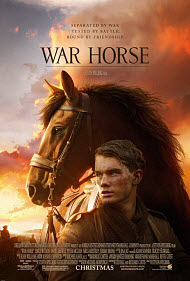

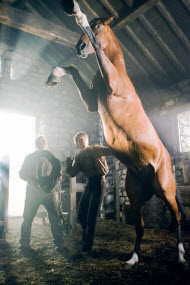
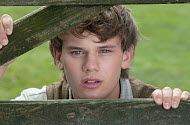
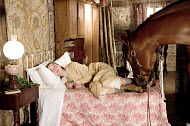
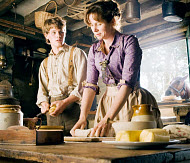
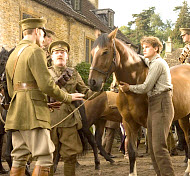
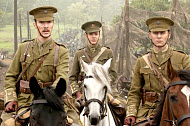
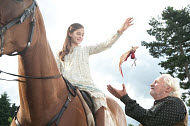
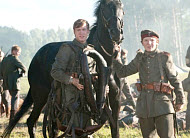
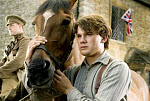
horses in the Bible
cavalry and the use of horses in wars over the years
World War I
alcoholism and drunkenness
living on and making a living from working a farm
agriculture in the Bible
Ted states that God gives each man bad luck, but feels that he got more than his share.
| Featuring |
|---|
|
Jeremy Irvine … Albert Narracott Peter Mullan … Ted Narracott Emily Watson … Rose Narracott Tom Hiddleston … Captain Nicholls Niels Arestrup … Grandfather David Thewlis … Lyons Benedict Cumberbatch … Maj. Jamie Stewart Toby Kebbell … Geordie Soldier See all » |
| Director |
|
Steven Spielberg |
| Producer |
|
DreamWorks SKG Reliance Entertainment Amblin Entertainment See all » |
| Distributor |
| Buena Vista and DreamWorks SKG |
“Separated by war. Tested by battle. Bound by friendship.”
“War Horse” is everything you would expect from a Steven Spielberg film. It’s a masterpiece of cinema in its detailed recreation of a story worth telling. Each frame could be a painting hung in a museum, speaking deeply into the souls of all those who were to view them one by one. There are spectacular visuals of southwestern rural England, with greens and blues, stunning sunsets, and the rocky soils with farmland images that are reminiscent of painter Jean-Francois Millet’s “The Angelus.” Even though film clips might depict the heartwarming story of love between a boy and his horse, this certainly is not a movie for children. It does tell that story, but it is set with the backdrop of World War I at the German frontlines—with many stark and brutal battle scenes, not fit for children.
There were millions of horses killed on all sides during WWI. It was the war that would end the cavalry charges of the past, as trench warfare, with barbed wire and machine guns and tanks spelled certain defeat and destruction for the war horses. In this period of transition, the horses were used to move cannons and guns and shipments, and thousands died just from being overworked or becoming emaciated under the conditions. This is the setting of the story “War Horse” and hints at just what is to take place in the film.
The well written screenplay by Lee Hall and Richard Curtis is based upon the children’s novel by the same name, written by Michael Morpurgo, who, to date has written more than 120 books (mostly children’s). War Horse, first published in the UK in 1982, also became a stage play in 2007. Much of the magic in the story must be attributed to this incredible author, matched only by the cinematic storytelling ability of Spielberg, himself. The story reeks with the undying optimism characteristic of Spielberg and Morpurgo, delving into the themes of redemption and the overcoming ability of the human spirit. [For interested readers, the story of “War Horse” continues in a follow up book called Farm Boy.]
A boy named Albert (Jeremy Irvine) grows up on a rural farm in Devon, son to an alcoholic father (Peter Mullan) and a supportive, yet enabling, mother (Emily Watson), who themselves are struggling for survival on a rented farm. It is here that Albert falls in love with young Irish half-thoroughbred, one his dad purchased irresponsibly only to spite his landlord (David Thewlis). Considered too weak for field work, by all, Albert is forced to make him plow the family’s rocky soil to save their farm and prove them all wrong, and thus the bond between them is set for the remainder of the film. Albert names him Joey, and the tenderness between the two of them is palpable. But at the outbreak of the war, and in dire financial straits, his father is forced to sell Joey to the British cavalry.
This devastating sale of Joey creates the separation anxiety that carries the viewer through the rest of the film. While Albert tries immediately to join the British cavalry, he is denied because he is too young—but all signs point to that changing, in the future.
Joey becomes the symbol of hope for all of humanity, even through the midst of such a terrible war. Each character, along the way, who takes custody of Joey is changed or altered in some way, an obvious expression of our common humanity, no matter what side we are on. There are several scenes where the common humanity of both sides comes into agreement and Joey is at the center of that picture. It is strongly reminiscent of an equally powerful French film, “Joyeux Noel” (2005), where enemy soldiers became temporarily united singing “Silent Night.”
The subtle, but outstanding performance of Peter Mullan (Albert’s dad Ted) cannot be overemphasized. His alcoholic persona belies a troubled past that holds secrets of a war from his own experience, but it is he who held the incorrect belief that God gives each man bad luck and stubbornly believes he’s gotten more than his fair share. Ted apparently isn’t familiar with Matthew 5:45,
That ye may be the children of your Father which is in heaven: for he maketh his sun to rise on the evil and on the good, and sendeth rain on the just and on the unjust.
Nor the Scripture from Proverbs 20:1,
Wine is a mocker, Strong drink is a brawler, And whoever is led astray by it is not wise.
Not surprisingly, a few of the profanities (a couple of hells) come from him. In all, there is very little cursing, with only one “damn” noted, along with a “Good Lord,” used in vain. There are a host of English expressions, like “bugger off you tight bastard”, “bugger me,” and “don’t be daft” which don’t carry the same weight in the American vernacular, but are offensive to some, nonetheless.
There is no sex or nudity, but only a mention by a 14 year old boy (Michael) [who had snuck into the army] of asking his older brother Günter about Italian women, to which he responds, you are too young.
These same brothers (on the German side) disobey orders from their superiors, and one does wonder what would have been their fates had they followed orders. This is a point to ponder in light of Romans 13:1-4: whether or not the truth of those Scriptures applies to believers only or even in a war, at all. Without becoming a spoiler, let it be said that it is possibly the most disturbing event in the entire film. Other disturbing images include bodies of horses and men in panoramic detail and intense fighting scenes, which are expected from a warzone, although nothing as intense as “Saving Private Ryan.”
By and large, the undying optimism that Spielberg consistently brings to his films is not missing in “War Horse,” and faith in humanity is predictably present. Noted is the underlying tone that it’s in humanity, not faith in God—though there is no put down necessarily for those that are of faith. Arguably, this is not his greatest work, but with John Williams’ musical score and some of those scenes in the final 20 minutes of this lengthy film, it certainly rates close to the top.
Violence: Heavy / Profanity: Minor / Sex/Nudity: None
See list of Relevant Issues—questions-and-answers.


I loved hearing God’s precious word being recited in an appropriate appeal to Almighty God for strength and protection. So much can and will be said about this movie as it will surely continue to be recognized for its brilliance. Viewers may leave this movie emotionally drained, but will be richer for the experience.
Moral rating: Good / Moviemaking quality: 5
Moral rating: Good / Moviemaking quality: 5
Moral rating: Excellent! / Moviemaking quality: 5
Moral rating: Excellent! / Moviemaking quality: 5
“War Horse” is a movie that grips your heart. You see areas of each character’s life being tested to the limits, during a very traumatic time in their lives—war. War is never glamorous, it is ugly, yet part of our world. We have our freedom because down through centuries men and woman have fought, lost lives, and been wounded for our freedom. Christ is our Victory ! And, if we or someone we know is involved in War right now, we need to hold them up in prayer. We can go to a movie, be gripped by a war movie, but daily we have families living this out in their own home. Let us not be entertained by war movies, let us go a step farther and find a way to help a family—pray for our soldiers and their families.
Moral rating: none / Moviemaking quality: 4
Moral rating: Better than Average / Moviemaking quality: 5
The story is a running composite of the horse and young man, as the war continues… but it does not seem to have an overall “theme” to it. I would always hesitate to criticize a Spielberg movie, given his body of work… but it just seems to be scenes clipped together. A masterpiece of cinematography, and storytelling within individual segments (the soldiers meeting to free the horse)… but it just seems to be scene after scene.
There was blessedly little to no language issues, and there were no language used that I would consider a “do not go” recommendation. I lived in the UK while in the military, and some of the language used might offend a person from the UK, given the meaning “over there”.
The film does not have a “Christian” aspect/slant to it, but it nonetheless a movie that is watchable without damaging your faith. It is a feel-good story, but not one that I would feel “strengthened” my walk with Christ; in which case I have to wonder if my time was well-spent. Watch young ones, as the war scenes are realistic… period. I would recommend the film with a caution to families with younger children.
Moral rating: Good / Moviemaking quality: 5
Moral rating: Better than Average / Moviemaking quality: 4½
I had a notebook with me and took notes throughout the movie. As a result I have put together a teaching on God calling us to be Warhorses (those who battle in prayer.)
Tomorrow night, I will begin teaching a series that was birthed from this movie. The scripture I am using to support this teaching is from Job 39:19-25. Needless to say, this movie was very inspirational to me, and I was so impressed with it that I took my granddaughters to see it with me 3 days later.
Moral rating: Good / Moviemaking quality: 5
Moral rating: Offensive / Moviemaking quality: 4
Seriously, Spielberg couldn’t find a French actress who spoke English well enough for that role? I could never watch that movie again, for that alone. It almost seemed to be mocking the French; it was so ridiculously exaggerated. Like a bad comedy sketch. Someone at Spielberg’s level can do better.
The cinematography was beautiful, the story interestingly told (if you could keep straight who was who) through the eyes of the horses.
***SPOILER*** The ending was completely unbelievable, however, as that much barbed wire would have made Joey nothing but a bloody, severely injured and probably deadly mess. The best part, of course, was the moment of cutting away the wire by the two soldiers. Very reminiscent of the movie “Joyeux Noel” based on a true story. Best part of the movie, hands down. ***END SPOILER***
If you have kids who can sit through a 2½ hour story, this is a very good film. I suggest explaining very well the difference between the German and Allied uniforms to help keep the story straight. If you speak French at all, the “French” granddaughter will drive you nuts.
Moral rating: Good / Moviemaking quality: 4
Sure, it had a great story, but I can’t believe how sad and depressing this was to watch. Sure, it was inspiring how this horse made it through the war, but, man, it was tough to watch; I feel like I have been through torture watching that film, and it wasn’t worth them being reunited at the end, just wasn’t worth it, and I love horses and love horse movies.
***SPOILER*** If you do go see it, shut your eyes when the horse starts running through the camp, you think it’s going to be victory, and he is escaping but he gets caught up in a mess of barbwire and almost dies, that was very traumatic to watch. I had to shut me eyes; it was gut wrenching. ***END SPOILER***
It is horrible to see what war is really like, I did learn some things from that perspective, but everyone dies, so many horrible things happen in this movie, even though it was very well made.
Moral rating: Better than Average / Moviemaking quality: 5
Moral rating: Average / Moviemaking quality: 5
It is a sentimental rollercoaster, designed for the sound bite, short attention span generation.
Parts are well filmed other parts are weak, in comparison to Spielberg’s best work. The suffering of the horse and of the human characters in the story has no purpose and no good end. Evil is not punished. Good is not rewarded. The looting of the weak by the strong, deliberate working to death of “noble” animals. The people who are noble gain nothing. The animal is the hero of the tale, not the humans. Death of the humans is treated as incidental, and treated in a blasé manner.
The horror of trench warfare and of no-man’s land is not really captured. From a director who recreated the horror of the slaughter of D-Day, such that the viewer could smell the fear (“Saving Private Ryan”), to only present a superficial presentation of the Somme is almost inexcusable.
The horse ploughing a path through the wire of no man’s land is totally unrealistic. The inconsistency of a horse which is underlined as being averse to jumping spontaneously becomes a champion hunter.
Children and animals are the ones who are alive in this tale. All others are stilted and constrained. This theme runs in many of Spielberg’s films. Thereby, the impetuous, disrespectful nature of the youth is glorified.
Blasphemy? The 30 pieces of silver. The father’s act of betrayal for 30 pounds. The beautiful, the noble is handed over to men of violence. So begins the silent suffering of the horse at the hands of violent men of all nations. The horse’s offering himself in place of his “friend.” The horse tied to a cross, its head crowned with barbed wire. The two horse lovers who take the horse from the cross alive. This is not a Christian act of faith like the story of Christmas peace on the Somme, but a humanist act of sentimentality.
The adulation of the War Horse as miraculous by the soldiers after the rescue. The motivation of this is alluded to as the need for humans who have lost so much and faced so much death to create an icon of hope. Don’t watch it; it is corrosive.
Moral rating: Average / Moviemaking quality: 3
The other thing was that the movie did not spend enough time with each character. The horse moved around from character to character, so many times, that it wasn’t really sad when someone died. Overall, it was a good movie, but I don’t think it’s one of those movies that you would go rush out and buy tickets for. You should wait to go see this movie at the dollar theater or rent.
But keep in mind that it is a war movie. But don’t worry, it’s not all blood and guts. In fact, I don’t remember seeing much blood, at all.
Moral rating: Better than Average / Moviemaking quality: 4
PLEASE share your observations and insights to be posted here.
Director Spielberg presents a juxtaposition between the battlefield scenery and the verses that are near perfect, so please watch this carefully, and you will surely enjoy, too, the rest of the film.
My Ratings: Moral rating: Better than Average / Moviemaking quality: 5